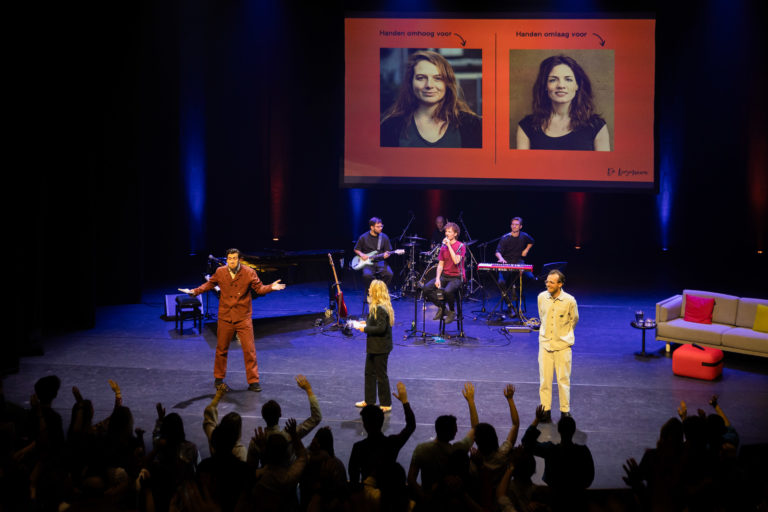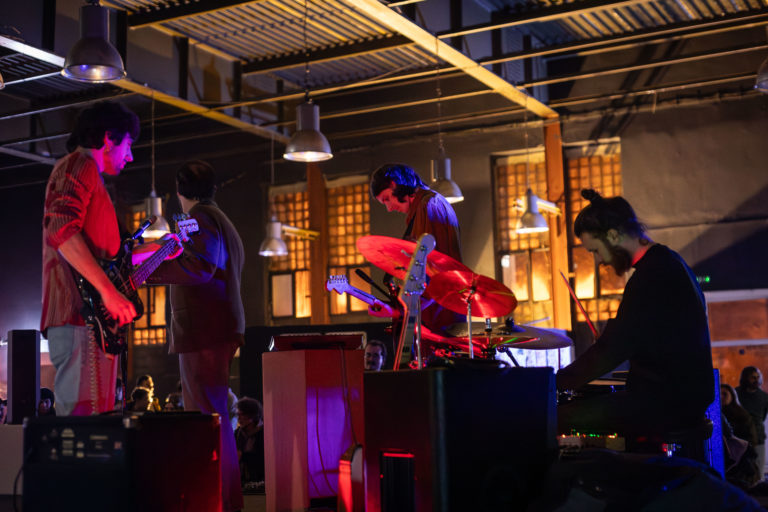Author: Manon Moulin
Each month, we highlight the Reset! members' projects or activities in one specific country through current news. This month, we put the spotlight on Europe as a whole, following the European parliamentary elections of June 6th-9th, 2024.
To get the pulse of the independent cultural and media sector, we interviewed Laura Naum and Petrică Mogoș, co-founders of Bucharest-based printed magazine KAJET Journal, as well as Dylan Ahern, artistic director of Amsterdam-based cultural event organiser DE/MO and co-founder of democracy promoter De Kiesmannen, Mika Hallbäck Vuorenpää, member of the team of Malmö-based music festival Intonal and multi-arts venue Inkonst, Tiago Sigorelho, president and editorial director of Lisbon-based platform for journalism, culture, and education Gerador, and finally Kalina Dukovska from Skopje-based cultural centre Laboratorium.

De Kiesmannen's De Grote Europashow in Stadsschouwburg in Utrecht – © Maike Schwarz
2024 is a special year in modern global history: over 40% of the world’s population will elect new parliaments and leaders, reshaping geopolitical landscapes. One of these elections is the world’s only and largest supranational election by direct universal suffrage: the European parliamentary elections, held between June 6th and 9th, 2024, in the 27 European member States of the European Union.
This election, like the previous nine European elections (since 1979), is a victim of abstentionism, with around one in two voters not casting a ballot. This trend reflects a general disinterest in European elections across the continent, with poorly attended campaigns. This was exacerbated by the fact that national elections were held at the same time. Indeed, in several European countries, such as Hungary and Romania, local elections were organised on the same day, overshadowing the European elections and their stakes. “EU elections are still ‘second-order elections’,” as Dylan Ahern puts it, explaining that in the Netherlands, people kept their attention on national issues, such as the government negotiations for coalition with far-right PVV in the centre of it. This could explain the 65% abstention rate among the Portuguese, who were mainly focused on their national parliamentary elections three months ago. From abstention to parallel and preceding national elections, these European elections were also quickly replaced by snap elections organised at national level, such as in France, where President Emmanuel Macron decided to dissolve the parliament after the European results, triggering a major crisis in the country and opening a window for a possible far-right government.
Because that is the main takeaway from these 2024 European elections; the big winners are both the conservative and the far-right groups. In fact, this new European Parliament will be dominated by the conservatives of the European People's Party (EPP) with 188 seats (up from 174 in 2019), followed by the far right with 185 seats, even if it is spread over several groups (European Conservatives and Reformists; Identity and Democracy; Various Far Right), and in third place the social democrats of the Progressive Alliance of Socialists and Democrats with 137 seats. The Ecologists and the Left are both far behind. Conservative and far-right parties came first or second in many European countries, including France, Italy, Germany, Poland, Belgium, Hungary, Austria, Croatia, Latvia, Slovenia, and others. How can we explain the rise of the far right across the continent and the dominance of right-wing parties? The answers are certainly varied and complex, as Laura Naum and Petrică Mogoș explain: “Another plausible interpretation may be that we are witnessing a hyper-normalisation of aberrant politics: with the surge of far-right discourses, we are collectively coming to terms with our new reality.”

Gola Planina performing at the FIJUK EXPO event in Laboratorium, Skopje, on January 4th, 2024 – © Laboratorium
What is this new reality? What could these results mean for independent cultural and media players? Well, a conservative and far-right domination means no good for culture, which is often less considered and neglected by the former, and dangerously exploited by the latter. Indeed, “as always, the conservatives want to quiet the free spirits of culture, as a way of controlling the opposition and nipping the buds of free thought. The EU election cements this further, on a larger scale,” explains Mika Hallbäck Vuorenpää, drawing on the Swedish experience after the 2022 national elections. Dylan Ahern underlines the ethno-nationalist roots of the far right’s position on culture; “the far right predominantly sees culture (‘our way of life’) as a mean to exclude others (Europeans of colour and non-EU citizens in general) and promote an ethnic cultural identity of Europe.” This danger would be exacerbated by the decline in funding for culture, “which today is facilitated through multiple support programmes,” as Tiago Sigorelho points out, and voted on in six-year cycles, the next of which is due in 2027 but is being discussed this autumn. The far-right also praise closed-borders. Laura Naum and Petrică Mogoș elaborate on this: “With the rise of ‘closed borders’ politics, cross-cultural collaborations may suffer. And what else might closed borders bring if not closed cultures?” This inward-looking strategy of the far right also raises concerns for EU candidate countries and their cultural organisations. “Usually a more conservative or right wing elective means less support for further EU enlargement and tightening on mobility control for non-EU citizens,” explains Kalina Dukovska from North Macedonia (candidate since 2005) and continues: “considering the fact that culture is often very fragile and at times abused on a national level , I think having an overarching budget and working groups dedicated to supporting independent art, giving opportunities for artist residencies and creating various artistic mobilities is the focal point of EU’s cultural support” – and should remain so.
This set of threats posed by the composition of the European Parliament are compounding the challenges already faced by independent cultural and media organisations across the continent and beyond, which all our interviewees agree on, and which they have to deal with on a daily basis: a general lack of funding for the independent scenes, a lack of spaces for independent practices, the weight of bureaucracy and complex application processes (both at national and EU level), but also increasingly strict legislations on cultural events.
Despite these perils, independent cultural and media players often “demonstrate elasticity, [and are known] to ‘resist’, ‘be resilient’, and ‘adaptable’”, even if this “flexibility is both a blessing and a curse,” as Laura Naum and Petrică Mogoș brought up. Dylan Ahern confirms that “the cultural and creative sectors always hit first, and are also always the first to hit back,” while Tiago Sigorelho affirms our common “role in anticipating trends and finding ways to correct deficiencies.” They all stressed the importance of solidarity and collective action, supported by networks that bring together different communities of independent players to “challenge the status-quo, to question its illusions, and finally seek to imagine viable alternatives.” On a combative and hopeful note, as Kalina Dukovska put it: “Giving up cannot be an option!”
Links to go further:
EU elections 2024: how did key countries vote and what does it mean? – The Guardian
All that changed on election night – Euractiv Podcast
Reset! member Magma collective’s post
Published on June 25th, 2024
About the author:
Manon Moulin is the editorial coordinator of all European projects for the non-profit organisation Arty Farty. She specifically works on the European network of independent cultural and media organisations Reset!, as well as the aggregation media We are Europe.